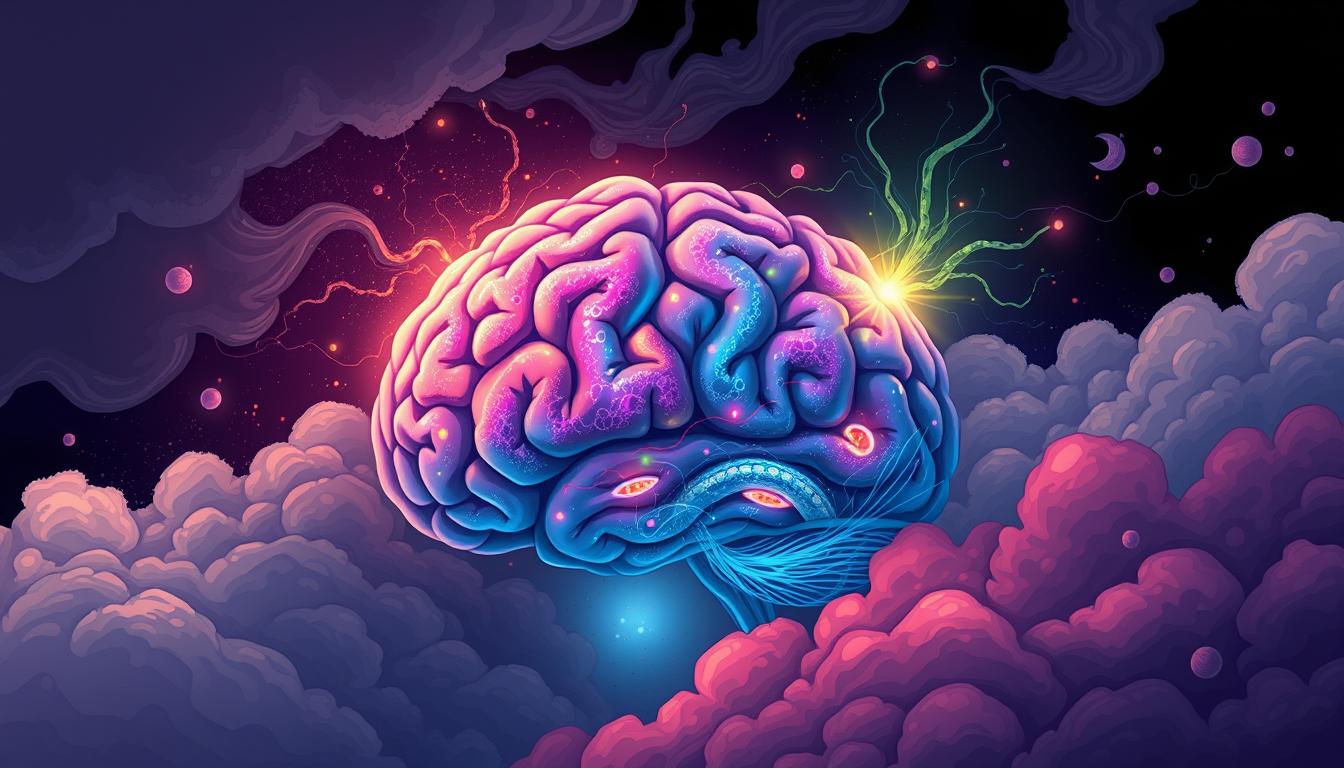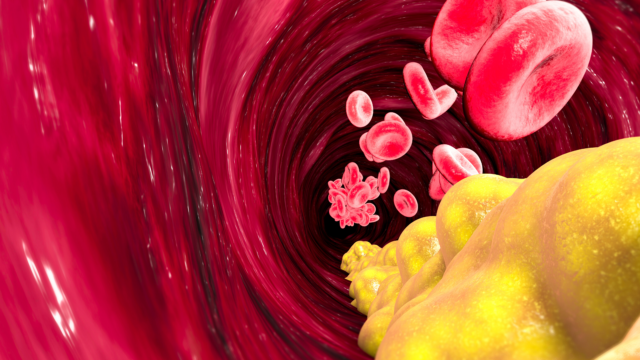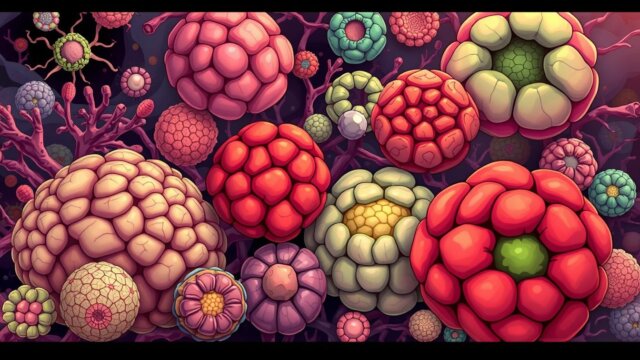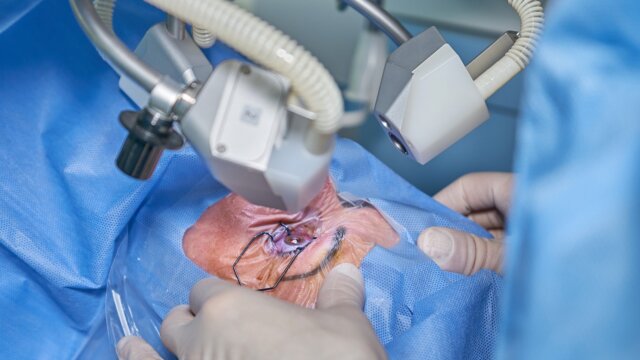FTC disclaimer: This post may contains affiliate links and we will be compensated if you click on a link and make a purchase.
The National Brain Tumor Society estimates that brain tumors affect about 30 adults out of 100,000 in the U.S. These growths can be cancerous or noncancerous and can really hurt a person’s health and quality of life. This article will cover brain tumors, their symptoms, how to diagnose them, and new treatments. It aims to help you understand and deal with this serious health issue.
Key Takeaways
- Brain tumors can be primary (originating in the brain) or secondary (spreading from other parts of the body).
- Malignant brain tumors, or brain cancers, can grow quickly and harm brain tissue.
- Symptoms of brain tumors vary based on the tumor’s size, location, and growth rate.
- Headaches are a common symptom, happening in about half of those with brain tumors.
- Diagnosis and treatment may include imaging tests, biopsy, surgery, radiation, and chemotherapy.
What is Brain Cancer?
Brain cancer, also known as a brain tumor, is an abnormal growth in the brain. It can start in the brain or spread from another part of the body. Though rare, it’s serious and can be life-threatening, needing quick medical help.
Types of Brain Tumors
There are many types of brain tumors, each with its own treatment. Common primary brain tumors include:
- Gliomas, which form in the brain’s glial cells. They are the most common primary brain tumor.
- Meningiomas, which grow in the brain and spinal cord’s membranes.
- Pituitary tumors, which occur in the pituitary gland at the brain’s base.
- Acoustic neuromas, which grow in the main nerve from the brain to the ear.
Malignant brain tumors grow fast and harm healthy brain tissue. Benign tumors grow slowly and don’t spread.
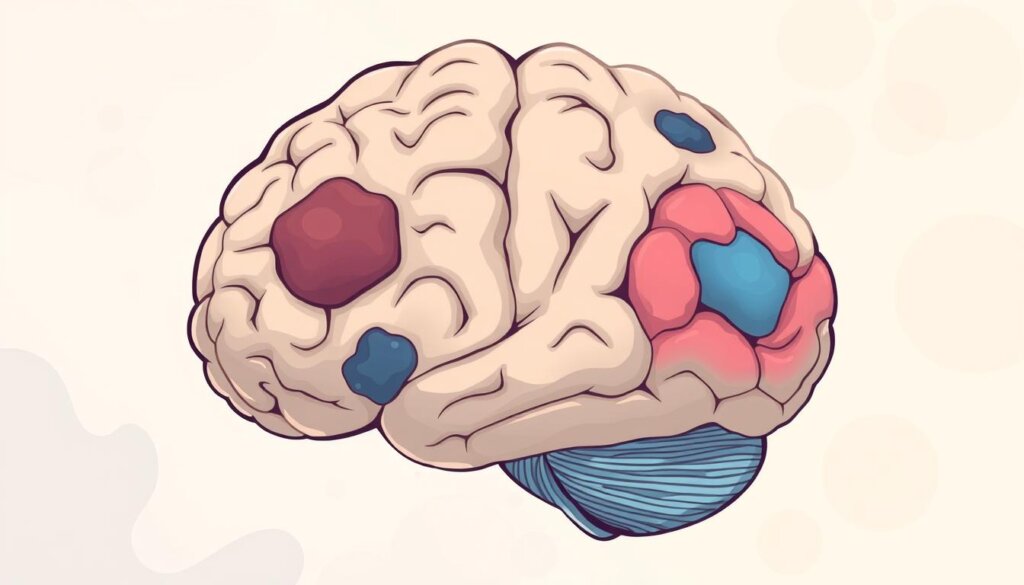
Brain tumors are graded 1 to 4, with 4 being the most aggressive. The tumor’s type, stage, and grade help decide treatment.
Tumor Type | Characteristics |
|---|---|
Gliomas | Most common type of primary brain tumor, originate in glial cells |
Meningiomas | Tumors that develop in the membranes surrounding the brain and spinal cord |
Pituitary Tumors | Tumors that form in the pituitary gland, a small endocrine gland at the base of the brain |
Acoustic Neuromas | Tumors that develop in the cells of the main nerve from the brain to the ear |
Symptoms of Brain Cancer
The symptoms of brain cancer can change a lot. This depends on the tumor’s size and where it is in the brain. Some symptoms are common, while others are more specific to certain areas of the brain.
Common Symptoms
Common symptoms include headaches, seizures, and nausea. You might also feel sick to your stomach, have vision problems, or have trouble balancing. Changes in how you think or feel can also happen.
Location-Specific Symptoms
The symptoms can also depend on where the tumor is. For example, a tumor in the frontal lobe might cause weakness on one side. Tumors in the temporal lobe can make it hard to speak or remember things.
Tumors in the occipital lobe can cause vision issues. And tumors in the cerebellum might affect how you balance and move.
Brain Lobe | Potential Symptoms |
|---|---|
Frontal Lobe | Personality changes, mood changes, behavior changes, weakness or numbness on one side of the body |
Parietal Lobe | Numbness or weakness in one side of the body, difficulty with spatial awareness |
Temporal Lobe | Difficulty hearing or speaking, memory loss |
Occipital Lobe | Loss of vision |
Cerebellum | Difficulty walking, uncoordinated muscle movements, balance problems |
Brainstem | Seizures, difficulty walking, changes in breathing |
How symptoms start and get worse can differ a lot. Some people might have many symptoms at once. It’s very important to see a doctor right away. This can help find and treat brain cancer early.
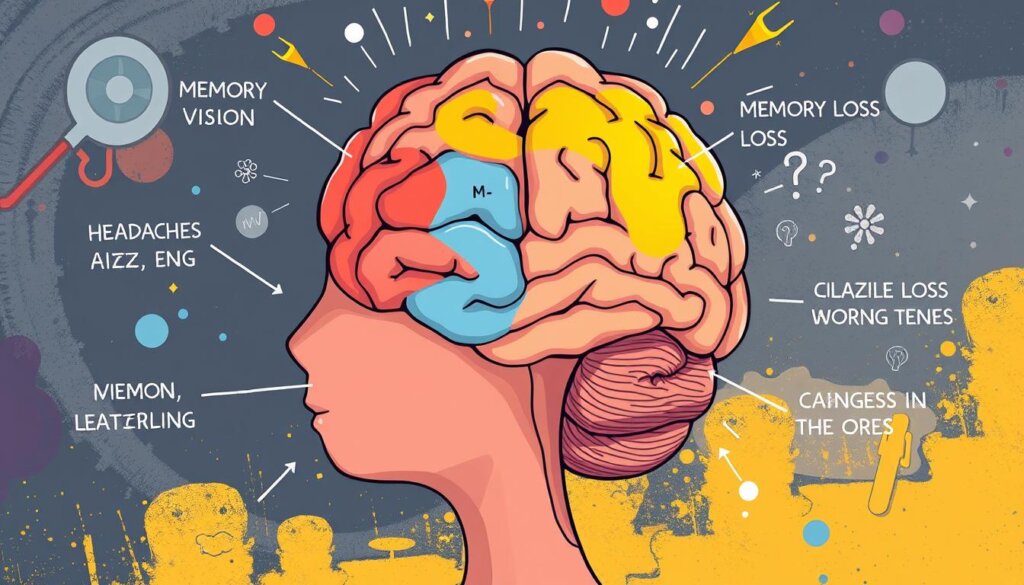
Brain Cancer
Brain cancer starts as abnormal cell growth in the brain or spinal cord. These tumors are part of the central nervous system (CNS). They can be either benign (noncancerous) or malignant (cancerous). Some common types include glioblastoma, medulloblastoma, and meningioma.
These tumors can harm the brain by destroying healthy tissue and putting pressure on other areas, leading to increased pressure in the skull.
Brain metastases are tumors that spread to the brain from another part of the body. They are five times more common than primary brain tumors. About one-third of patients with another cancer will get brain metastases. The risk goes up after age 45.
The most common cancers to spread to the brain are lung, breast, colon, kidney, and melanoma. Symptoms can include headaches, personality changes, memory loss, and seizures.
Treatment for brain cancer and metastases may include surgery, radiation, chemotherapy, and immunotherapy. The goal is to ease pain, improve symptoms, and extend life. New treatments and clinical trials are being explored to help patients with these tough tumors.
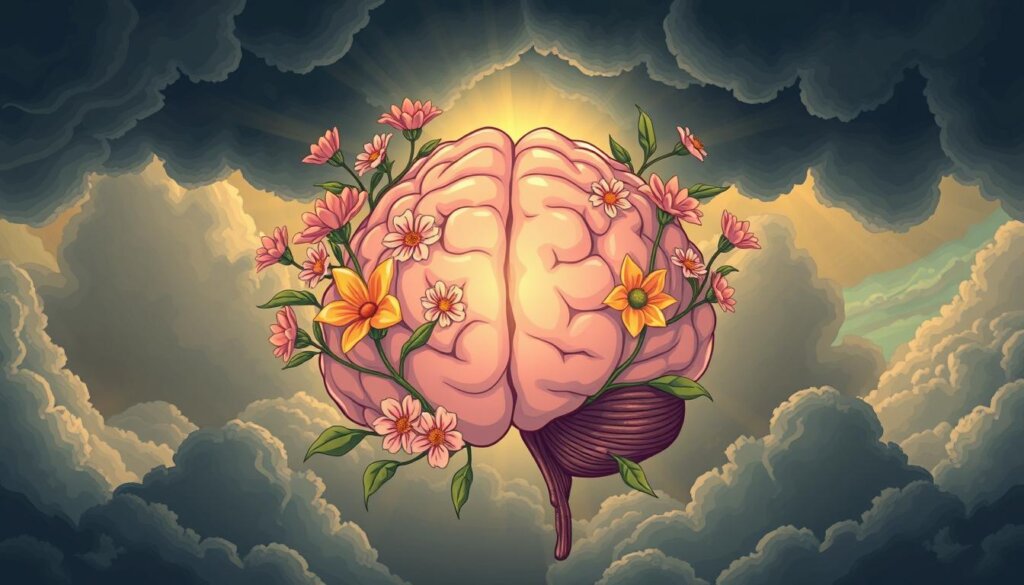
“Brain cancer is a complex and challenging disease, but research and medical advancements are providing new hope for patients and their families.”
Diagnosis and Treatment
Diagnosing brain cancer often uses neuroimaging tests. Magnetic Resonance Imaging (MRI) is key because it shows the brain clearly. Other tests don’t compare. A PET scan uses a radioactive tracer to find fast-growing tumors. But, it’s not as good for slow-growing ones. Brain biopsies are risky but give vital info about the tumor.
Surgical Interventions
Brain tumors are graded from 1 to 4, with higher numbers, meaning they grow faster. Treatment choices depend on the tumor’s type, size, and where it is. They also look at the patient’s health.
Surgery tries to remove all tumor cells. The goal is to take it all out if possible. But, sometimes, only part can be removed to ease symptoms. Craniotomy is a common surgery to remove part of the skull to get to the tumor. Awake brain surgery is used too. The patient is awake to help avoid harming important brain areas.
Diagnostic Test | Description |
|---|---|
MRI | Provides clearer images of the brain compared to other imaging techniques. |
PET Scan | Detects rapidly growing brain tumors but may not be as effective for slow-growing benign tumors. |
Brain Biopsy | Provides critical information about the type and grade of the brain tumor, but carries risks. |
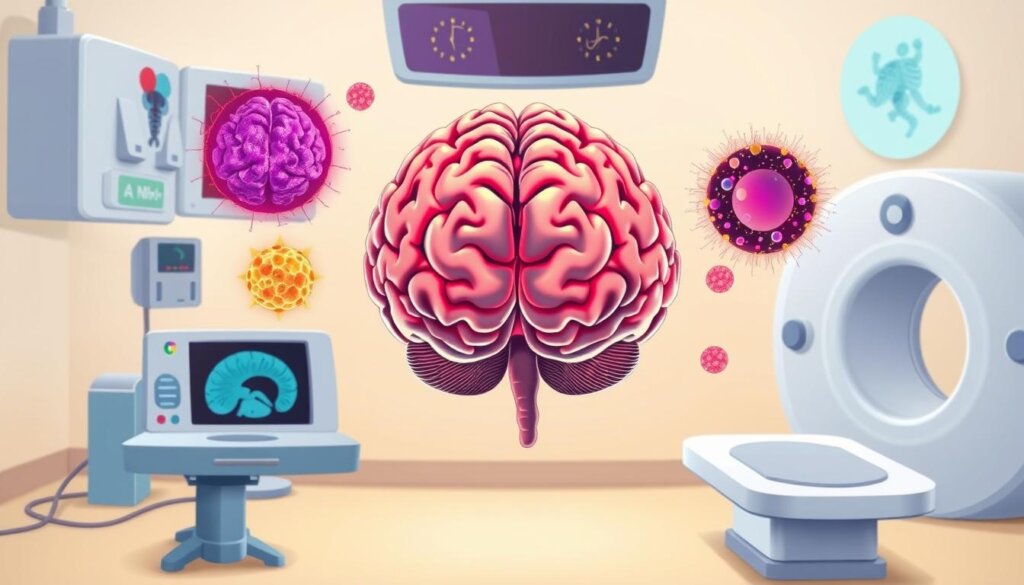
“Surgery for brain tumors aims to remove all tumor cells, with the goal of complete removal when feasible, but sometimes only partial resection is possible to reduce symptoms.”
The Impact of Brain Cancer
Brain cancer can deeply affect a person’s life. It impacts their thinking, body, and feelings. The Brain Tumour Charity says it causes headaches, seizures, and vision problems. It also changes how people act and feel.
These symptoms make everyday tasks difficult. They can affect work and social life, making it difficult for patients to stay independent and happy.
Brain cancer also messes with thinking. It can hurt memory and focus. This makes it hard to work, manage money, and socialize.
It also affects feelings. The stress of diagnosis and treatment can cause anxiety and depression. More than half of brain cancer patients feel mood changes.
Impact of Brain Cancer | Percentage of Patients Affected |
|---|---|
Headaches | About 50% |
Personality or Mood Changes | More than 50% |
Deep Vein Thrombosis | Nearly 20% |
Seizures | Around 60% |
It’s important to help with brain cancer’s physical, emotional, and practical challenges.
“The diagnosis and treatment of brain cancer can be highly stressful and can lead to feelings of anxiety, depression, and isolation.”
Coping and Support
Getting a brain cancer diagnosis is very tough and emotional. It’s key to finding the right support to deal with the physical and mental effects.
You might feel shock, denial, anger, guilt, anxiety, depression, and then acceptance. Your journey is unique, so be kind to yourself.
Treatment can bring symptoms like nausea, vomiting, and changes in taste. Eating small meals and drinking lots of water can help. A diet rich in protein, carbs, healthy fats, fruits, and veggies is also good.
Looking for emotional support is very helpful. You might want to join a support group or talk to a counselor. Many people find physical therapy and counseling key, along with the help of family and friends.
Doing wellness activities like exercise and mindfulness can help manage symptoms. Online support groups can also offer a network of understanding people.
Don’t hesitate to ask questions and do some research. Stay positive and accept your new reality as you recover.
Research and Clinical Trials
Brain cancer research is very important. Researchers and doctors work hard to find new ways to treat this disease. Clinical trials help by offering new innovative treatments like targeted therapies and immunotherapy. These trials help make brain cancer care better for everyone.
These trials check if new treatments work and are safe. They help us learn more about treating brain cancer. Some trials look at things like immunotherapy, radiation, and new drugs. For example, one trial compares different treatments for certain brain cancers based on genetic markers.
- The INCIPIENT clinical trial tested a new CAR-T therapy for glioblastoma (GBM). It showed big improvements in the first three patients.
- Patients saw almost all their tumors gone after just one treatment.
- The NCI-CONNECT program is running trials for 12 rare brain cancer types.
Joining clinical trials can give patients new treatments and help find better ways to fight brain cancer. The Brain Tumor Network (BTN) and Clinicaltrials.gov help find trials and guide treatment choices.
Research is also working on finding brain cancer early and making treatments better. It aims to improve life for those with brain cancer. Studies help us understand symptoms and how treatments work.
“Clinical trials are essential for testing new and innovative therapies, as they provide patients with access to cutting-edge treatments and contribute to the development of more effective and personalized care.”
By joining trials, patients help advance brain cancer research. They might also get new treatments that could help them. The work of researchers, doctors, and patients is key in fighting this tough disease.
Conclusion
Brain cancer is a tough condition that affects a person’s health and mind. But, research and treatments are getting better all the time. Finding and treating cancer early is key to better health and quality of life.
Knowing about brain tumors and their signs helps patients and families deal with the disease. Early action and treatment are very important. They can change the disease’s course and the patient’s future.
This article outlines what’s important for those facing brain cancer. By staying informed and working with doctors, patients can improve their own care and their outcomes.
FAQ
What is brain cancer?
Brain cancer is when abnormal cells grow in or around the brain. These tumors can be cancerous or not. They can harm brain function and health if they grow too big.
What are the different types of brain tumors?
There are many types of brain tumors. Gliomas and meningiomas are common. They can be either benign or malignant.
What are the common symptoms of brain cancer?
Symptoms include headaches, seizures, and vision problems. You might also feel dizzy or have balance issues. Tumors in different parts of the brain can cause different symptoms.
How is brain cancer diagnosed?
Doctors use CT scans, MRI scans, and PET scans to find tumors. They might also take a biopsy to check the cells.
What are the treatment options for brain cancer?
Treatment depends on the tumor’s type and size. Options include surgery, radiation, and chemotherapy. Surgery can be done in different ways.
How does brain cancer impact a patient’s quality of life?
Brain cancer can affect many areas of life. It can harm cognitive function and physical abilities. It can also affect emotional wellbeing.
How can patients and their families cope with brain cancer?
Emotional support is key. Support groups, counseling, patient advocacy groups, and educational resources can help.
What are the latest research and clinical trials in brain cancer?
Research is ongoing to find better treatments. Clinical trials test new therapies. They offer patients access to new treatments and help improve care.
